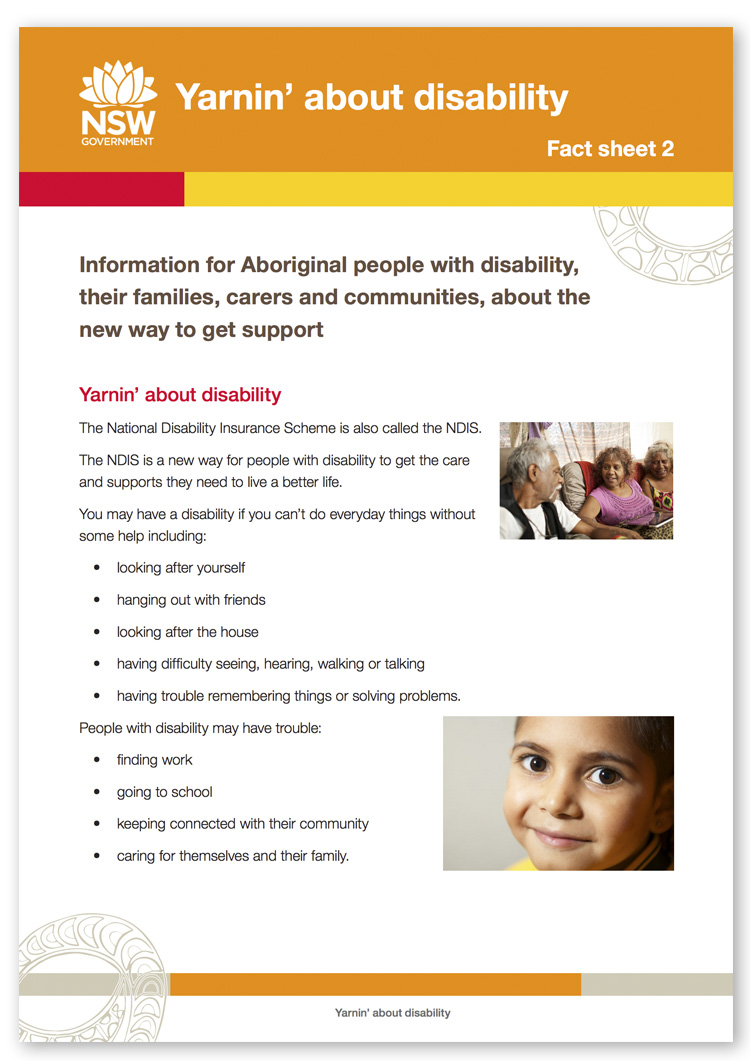Fact sheet - Yarnin’ about disability (2 of 5)
The New South Wales (NSW) Government has produced a series of 5 fact sheets for Aboriginal and Torres Strait Islander people with disabilities from NSW.
This is Fact sheet 2: Yarnin' about disability
Download this fact sheet as a PDF or continue reading below.
Yarnin’ about disability
The National Disability Insurance Scheme is also called the NDIS.
The NDIS is a new way for people with disability to get the care and supports they need to live a better life.
You may have a disability if you can’t do everyday things without some help including:
- looking after yourself
- hanging out with friends
- looking after the house
- having difficulty seeing, hearing, walking or talking
- having trouble remembering things or solving problems.
People with disability may have trouble:
- finding work
- going to school
- keeping connected with their community
- caring for themselves and their family.
Disability and Aboriginal communities
Your community might see people with disability as just needing some help from their family, friends, mob or community, rather than getting help from a service provider.
You can get help from family, friends, mob and community if you use the NDIS.
The NDIS will provide extra support for people with disability to:
- continue living in their community
- staying connected with their mob
- living life their way.
What support can you get from the NDIS?
There are different types of support provided by the NDIS, including:
- special accommodation, such as group homes
- support for people to stay in their own home – for example, someone comes into your home to help with everyday tasks
- help going to school or looking for a job
- help with new support aids like a wheelchair or a communication device
- help going to appointments and activities in the local community
- learning new skills like cooking, using computers or managing your money.
The NDIS gives people with disability choice and flexibility over the supports they need.
This means you and your family can also choose who provides that support to you or the person you care for.
What should you do next?
If you already receive disability support or services from a service provider you can have a yarn with them about the NDIS and what it all means.
They can also explain what other types of disability support are available and who can provide the support you may be looking for.
There may be other people in your community who may want to learn about the NDIS as well. Yarn with them, share ideas and swap stories.
Check out in your community for local NDIS workshops, forums or information sessions being held. If you can’t attend, remember to call and ask for information to be sent out to you.
The National Disability Insurance Agency (NDIA) will work out if you can use the NDIS.
You can phone the NDIA and have a yarn with them on 1800 800 110 or you can get more information on the website: www.ndis.gov.au
There is also a checklist on the NDIS website to help you find out if you are able to apply for the NDIS: www.ndis.gov.au/ndis-access-checklist
You may like to check when the NDIS will be available in your area by entering your postcode on the NSW NDIS website: www.ndis.nsw.gov.au
More Information
There are several fact sheets available for Aboriginal People about the NDIS in NSW. These include:
- Fact sheet 1: NDIS for Aboriginal people with disability in NSW
- Fact sheet 2: Yarnin’ about disability
- Fact sheet 3: What is the NDIS?
- Fact sheet 4: Getting ready for the NDIS
- Fact sheet 5: Accessing the NDIS
This information is sourced from http://ndis.nsw.gov.au/ndis-resources/aboriginal-people/fact-sheet-yarnin-about-disability/
© – Copyright – Ageing, Disability and Home Care, Department of Family and Community Services NSW for and on behalf of the Crown in right of the State of New South Wales.


